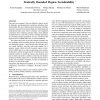Free Online Productivity Tools
i2Speak
i2Symbol
i2OCR
iTex2Img
iWeb2Print
iWeb2Shot
i2Type
iPdf2Split
iPdf2Merge
i2Bopomofo
i2Arabic
i2Style
i2Image
i2PDF
iLatex2Rtf
Sci2ools
102
click to vote
ASPLOS
2015
ACM
2015
ACM
Hybrid Static: Dynamic Analysis for Statically Bounded Region Serializability
Data races are common. They are difficult to detect, avoid, or eliminate, and programmers sometimes introduce them intentionally. However, shared-memory programs with data races have unexpected, erroneous behaviors. Intentional and unintentional data races lead to atomicity and sequential consistency (SC) violations, and they make it more difficult to understand, test, and verify software. Existing approaches for providing stronger guarantees for racy executions add high run-time overhead and/or rely on custom hardware. This paper shows how to provide stronger semantics for racy programs while providing relatively good performance on commodity systems. A novel hybrid static–dynamic analysis called EnfoRSer provides end-to-end support for a memory model called statically bounded region serializability (SBRS) that is not only stronger than weak memory models but is strictly stronger than SC. EnfoRSer uses static compiler analysis to transform regions, and dynamic analysis to detect ...
| Added | 16 Apr 2016 |
| Updated | 16 Apr 2016 |
| Type | Journal |
| Year | 2015 |
| Where | ASPLOS |
| Authors | Aritra Sengupta, Swarnendu Biswas, Minjia Zhang, Michael D. Bond, Milind Kulkarni |
Comments (0)

